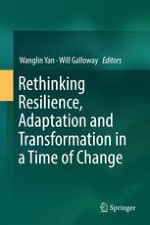2017 | OriginalPaper | Buchkapitel
13. Developing an ICT-Based Toolbox for Resilient Capacity Building: Challenges, Obstacles and Approaches
verfasst von : Qian Ye, Xiaobing Hu, Zhangang Han
Erschienen in: Rethinking Resilience, Adaptation and Transformation in a Time of Change
Aktivieren Sie unsere intelligente Suche, um passende Fachinhalte oder Patente zu finden.
Wählen Sie Textabschnitte aus um mit Künstlicher Intelligenz passenden Patente zu finden. powered by
Markieren Sie Textabschnitte, um KI-gestützt weitere passende Inhalte zu finden. powered by
